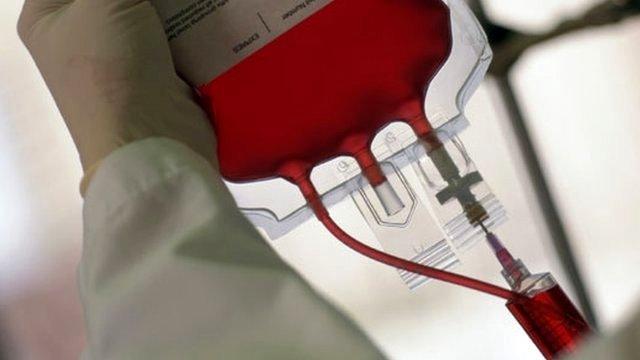'Blood contamination tore my family apart'
- Published
Brothers David, Vincent and Barry all died as a result of blood contamination
Thousands of people with haemophilia were infected with HIV and hepatitis as a result of NHS treatments in the 1970s and 80s. But their families are still seeking a public inquiry into the scandal.
Tony Farrugia was just 14-years-old when his father Barry died of Aids.
Over the next 20 years, two of his four uncles would also die in what was perhaps the worst treatment scandal in the NHS's history.
In the 1970s and 80s, thousands of haemophiliacs - like members of Tony's family - were treated with contaminated blood products.
Some 4,670 of them were later diagnosed with hepatitis C, while around 1,200 also contracted HIV.
Many did not live long enough to be treated with modern drugs.
Thirty years later, the survivors and their relatives have told the BBC's Victoria Derbyshire programme they are still fighting for answers.
Some are worried that a new support scheme planned by the government could leave them struggling to pay mortgages and bills.
Contamination
Tony's father Barry was diagnosed with haemophilia - a genetic condition that prevents blood from clotting - as a baby.
It took Tony almost 25 years to get hold of his father's medical records after his death.
They show that Barry was a mild haemophiliac, whose symptoms could have been managed.
He might not have needed to be treated with the blood clotting agent Factor VIII - the cause of the contamination - but it was prescribed anyway.
The result was that he was infected with hepatitis B in the late 70s and then with HIV as early as 1980.
Entries in the records show that doctors were aware he might have had the virus two years before he was finally told.
By 1985, Barry's health had declined rapidly.
Tony, then a teenager, was sent away to live with other family members but the new living arrangements did not work out and he was eventually placed in care.
In the summer of 1986, he visited his father in hospital for the final time.
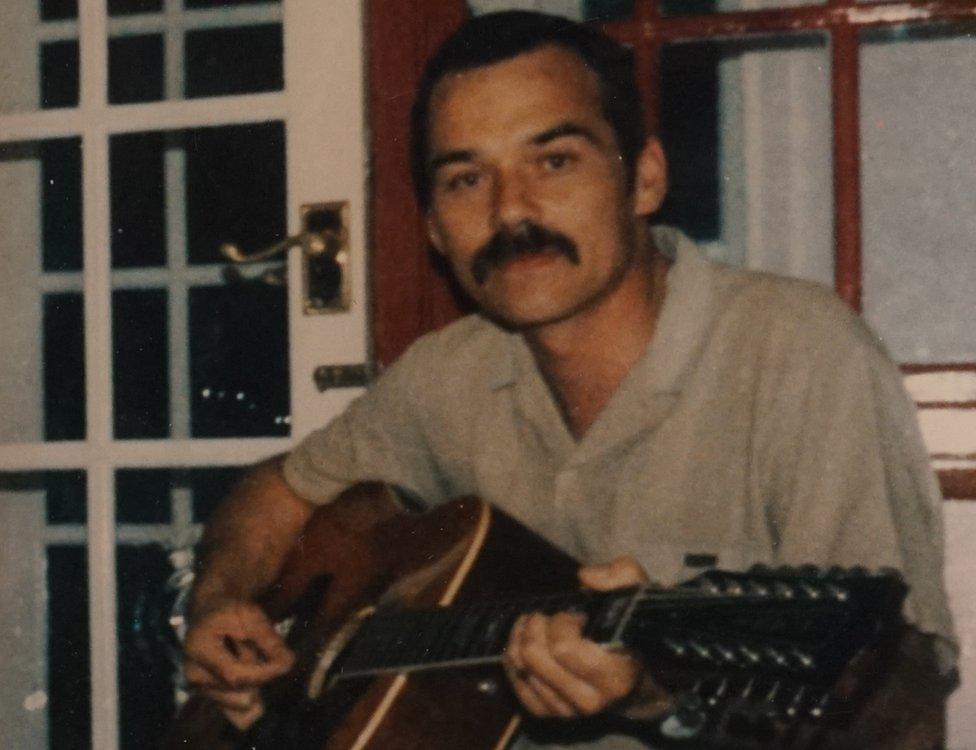
Barry contracted hepatitis B and Aids
"He started to lose weight by then," Tony recalls, "a lot of weight - so he was really, really skinny."
"I remember my dad asking me for some of my ice cream. I handed it to him, at which point one of the nurses intervened and said 'you can't give him that'.
"He had blisters in his mouth which were bleeding. I couldn't share an ice cream with my dad because they had given him Aids," he says.
Barry's death in September 1986 split the family apart.
Tony went back into care in Luton while his twin brother David went to a separate care home in North London.
His older teenage brothers were left to fend for themselves.
Family 'haunted'
It was not until 2010 that he was reunited with other members of his family.
"That was the first time since dad died that we were together again," Tony says.
"That's what the [health service] did, they destroyed my dad with these viruses then they watched his family crumble."
In the years after Barry's death the family continued to struggle.
One of Barry's brothers, Vincent, was killed by Aids passed on through contaminated blood.
In 2012, another brother, David, died suddenly of a brain haemorrhage linked to the hepatitis C he had contracted through Factor VIII.
Madeline, David's widow, says the contaminated blood scandal has caused "devastation" to her family.
"I can put my hand on my heart and tell you I am not the same person [since David's death]. I will never be the same person," she said.
"It comes back to haunt you in so many ways."
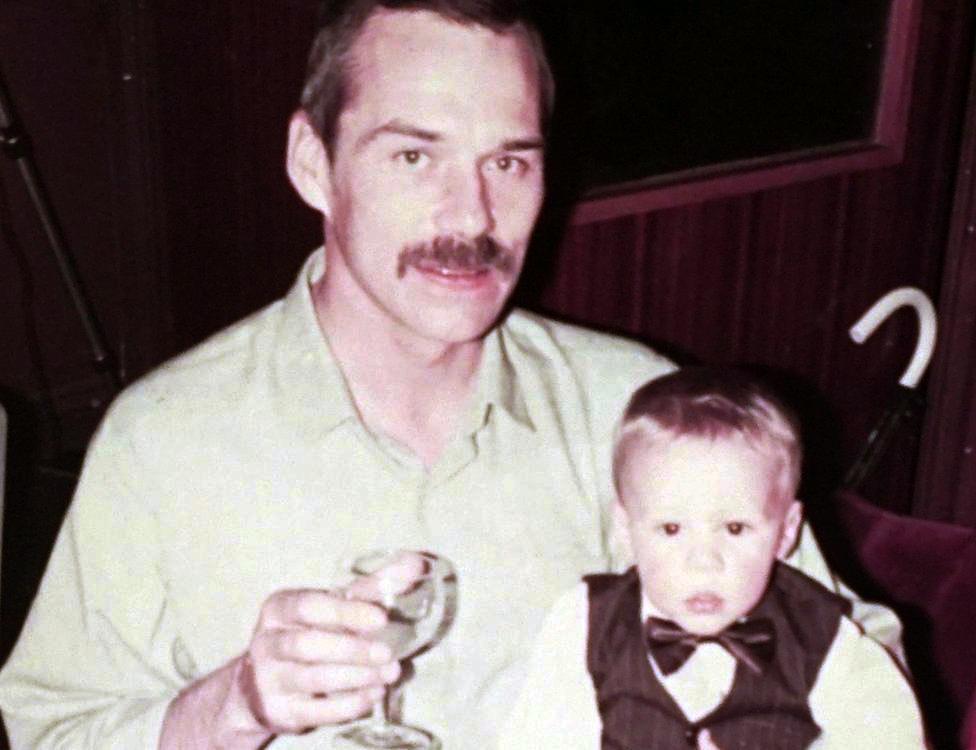
Barry died in September 1986
Madeline says the doctors who prescribed Factor VIII "never, ever" told them there was a risk of blood contamination.
Angie, Barry's sister, adds: "Treatment shouldn't kill you, should it? Medical treatment shouldn't kill you."
The family say they also had to live with the stigma that surrounded Aids in the 1980s.
On one occasion, Vincent had "Aids scum" scratched into his car.
'Face up'
When he walked into his local cafe one day, everyone else got up and walked out.
"It was awful - awful - to see this happen to a person," Angie said.
The family are still looking for answers as to why their relatives died and have called for a public inquiry.
"All we are after is recognition for the harm which was done. We still haven't got the truth and they haven't given us all the answers," says Tony.
"The government can't learn lessons until they face up to what they have done."
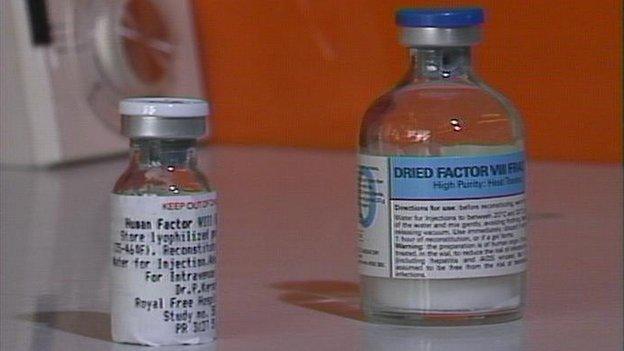
Thousands of people in the UK were infected when they were treated with imported blood products in the 1970s and 80s
There have been two previous inquiries.
One was privately funded from donations and could not force health officials or ministers to testify.
The other only looked at a small number of Scottish victims and did not have the power to summon witnesses from England.
The Haemophilia Society is now calling for a full public inquiry into the scandal, something the government has so far ruled out.
Victims and their families are also worried that a new financial support scheme currently being planned could leave some worse off.
Under the proposals, a widow of a haemophiliac who died from Aids in England will receive a one-off sum of £10,000, compared to a lifetime payment of £27,750 a year in Scotland.
'A shambles'
A new Welsh scheme announced this month is also significantly more generous than in England and Northern Ireland.
"The whole thing is a shambles, it's shameful," says Sue Threakall, of the campaign group Tainted Blood.
"These are payments which people rely on to pay their mortgages, pay rent and feed their families."
The government says it has doubled the amount it is spending on support payments to those affected since 2015.
"This is significantly more than any previous government has provided for those affected by this tragedy," a spokesman for the Department of Health said.
"We will continue to listen and are currently consulting on new measures to extend the group of individuals who benefit from higher annual payments."
Watch the Victoria Derbyshire programme on weekdays between 09:00 and 11:00 on BBC Two and the BBC News channel.
- Published8 September 2016
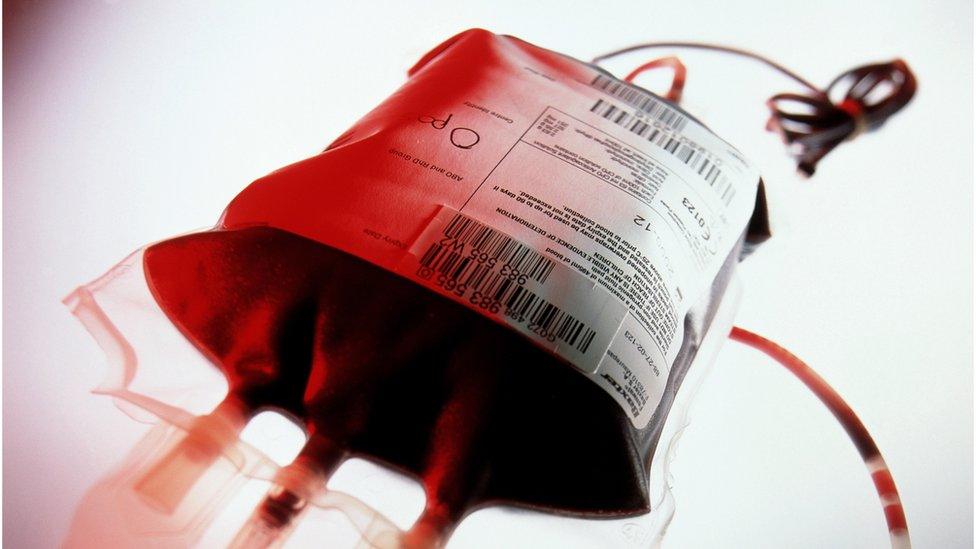
- Published2 September 2016
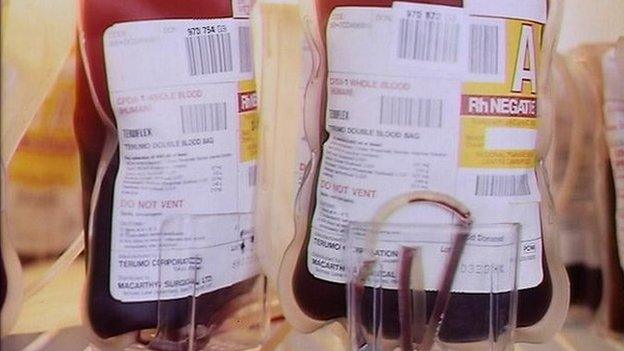
- Published15 January 2015
